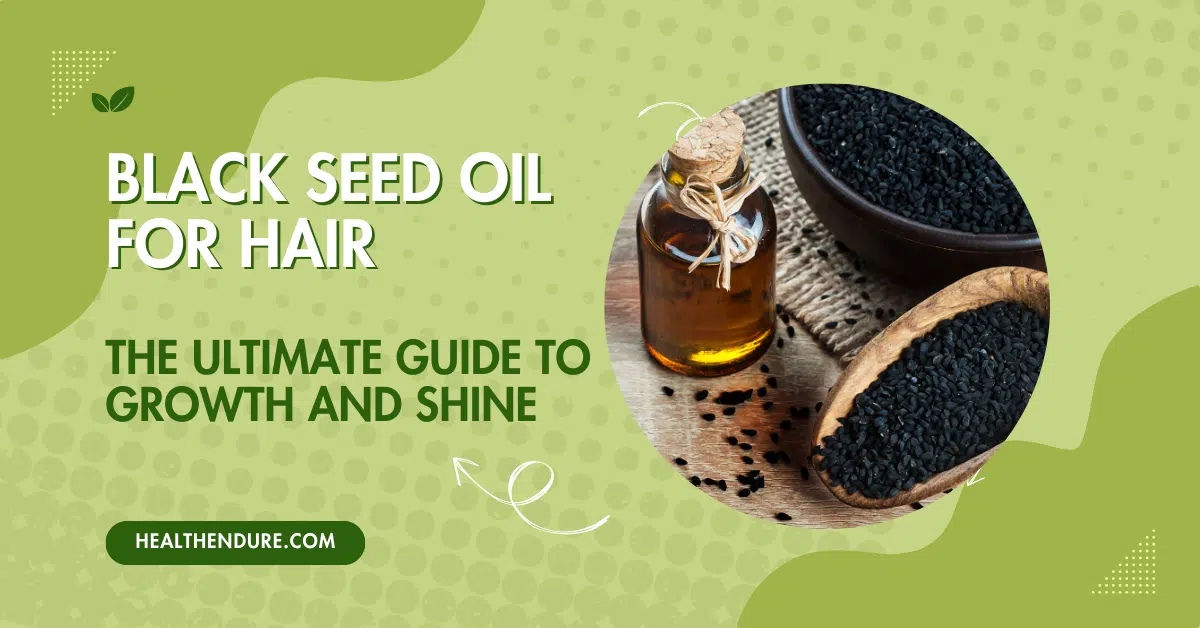For centuries, black seed oil, also known as Nigella sativa oil, black cumin seeds oil, or Kalonji oil, has been revered for its medicinal properties in various cultures. Extracted from the seeds of the Nigella sativa plant, this golden oil boasts a rich history of use in traditional medicine for a variety of ailments. This Black Seed Oil for Hair is a powerful natural remedy that promotes hair growth and improves overall health.
Research has extensively studied black seed (Nigella sativa) for its biological activity and therapeutic potential. It has been found to possess a broad spectrum of benefits, including antioxidant properties, anti-cough effects, gastroprotective actions, anti-anxiety capabilities, and anti-ulcer benefits. Additionally, black seed is known for its anti-asthmatic, anti-cancer, anti-inflammatory, and immuno-modulatory activities. It has antitumor properties, and hepatoprotective effects, and can cure gastric ulcers, slow tumor growth, improve memory, stimulate milk production, and exhibit antibacterial activity.
Black Cumin Seed Oil’s Hair Benefits

Black cumin seeds are highly beneficial for hair health. Rich in essential fatty acids, vitamins, and minerals, these seeds help strengthen hair follicles, reduce hair loss, and promote overall scalp health.
Black Seed Oil for Hair Growth
- Thymoquinone: This bioactive compound in high concentrations within black seed oil exhibits anti-inflammatory and antioxidant properties. Many suggest that Thymoquinone (TQ) may play a role in stimulating hair growth by promoting blood circulation to the scalp and nourishing hair follicles.
- Essential Fatty Acids: Black seed oil is rich in essential fatty acids, like linoleic and oleic acids, crucial for healthy hair growth. Research claimed that the primary fatty acid profile of cumin seed oil reveals a high content of linoleic acid (59.39%) and oleic acid (25.72%). Studies also claimed that These fatty acids help maintain the scalp’s natural barrier function, preventing excessive dryness and promoting a healthy environment for hair follicles to thrive.
Combating Scalp Issues With Black Seed Oil
- Anti-inflammatory Properties: Black seed oil’s anti-inflammatory properties may benefit those experiencing scalp conditions like dandruff or psoriasis. The scalp can create a more optimal environment for healthy hair growth by reducing inflammation and irritation.
- Antimicrobial Effects: The black seed oil possesses antimicrobial properties that could help combat scalp issues caused by fungal or bacterial growth. This element can contribute to a healthier scalp environment and potentially reduce hair loss associated with such conditions.
Power of Black Seed Oil for Hair: Applications and Practical Tips
Here are some practical ways to incorporate black seed oil’s natural ingredient and witness its potential for your hair growth:
Topical Application Methods
- Black Seed Oil Hair Mask: Mix a tablespoon of black seed oil with two tablespoons of carrier oil like jojoba or coconut oil. Massage the mixture gently into your scalp and hair, focusing on the ends. Leave it on for 30 minutes to an hour before rinsing thoroughly with shampoo and conditioner.
- Black Seed Oil Scalp Treatment: Dilute black seed oil with carrier oil in a 1:1 ratio. Massage the diluted oil directly onto your scalp, focusing on areas prone to dryness or irritation. Leave it on for 20-30 minutes before shampooing.
Dietary Supplementation
Black seed oil can also be consumed internally in capsule form. However, it’s crucial to consult with a healthcare professional before starting any new supplements, especially if you have any pre-existing medical conditions or are taking medications.
Important Considerations
- Patch Test: Before applying black seed oil directly to your scalp or hair, perform a patch test on a small area of your inner arm. Monitor for any signs of irritation for 24 hours before using it on your scalp.
- Quality Matters: Choose high-quality, cold-pressed black seed oil for optimal benefits. Look for brands that are certified organic and free of additives.
What is Black Seed Oil Good For?
Beyond its potential benefits for hair health, black cumin seeds have many benefits. This herb is traditionally used to address a variety of health concerns. Here’s a quick glimpse:
- Digestive Issues: Black seed oil has been used traditionally to soothe the digestive tract and support gut health.
- Respiratory Problems: Some studies suggest black seed oil might benefit respiratory conditions like asthma and allergies.
- Skin Health: Black seed oil’s anti-inflammatory properties may help manage skin conditions like eczema and psoriasis.
- Other Potential Benefits: Consuming black seed (nigella sativa) can help boost the immune system, regulate blood sugar levels, and manage weight. These benefits make Nigella sativa a valuable addition to a healthy diet and lifestyle.
Potential Side Effects and Considerations
While black seed oil boasts a generally safe profile, it’s essential to be aware of potential side effects and considerations before incorporating it into your hair care routine:
Side Effects
- Skin Irritation: Black seed oil can cause skin irritation in some individuals, mainly when applied directly. Always perform a patch test before using it on your scalp or hair.
- Stomach Upset: Ingestion of black seed oil capsules may lead to mild stomach upset or digestive issues in some people. Start with a low dosage and gradually increase if tolerated.
- Drug Interactions: Black seed oil may interact with certain medications. Consult your doctor before using black seed oil if you take any medications, particularly blood thinners or medications that affect blood sugar levels.
Safety Considerations
- Pregnancy and Breastfeeding: Studies suggested that black seed oil is not recommended for pregnant or breastfeeding women due to a lack of sufficient safety data.
- Medical Conditions: If you have any pre-existing medical conditions, consult with your doctor before using black seed oil, both topically and internally.
Where to Find Black Seed Oil
Black seed oil can be readily found at most health food stores, online retailers, and specialty grocery stores. Look for high-quality, cold-pressed black seed oil that is certified organic and additives-free.
Conclusion: Unveiling Your Hair’s Full Potential
Black seed oil emerges as a promising natural ingredient with the potential to enhance your hair’s health and beauty. Indeed, it potentially promotes hair growth and strengthens strands, while also combating scalp issues and fostering a healthy environment for hair follicles. Thus, black seed oil offers a multifaceted approach to hair care.
However, it’s crucial to remember that research on its effectiveness for hair is ongoing. While the science behind its potential benefits is promising, further studies are needed to solidify its role in mainstream hair care routines.
Ultimately, deciding to incorporate black seed oil into your hair care regimen depends on your needs and preferences. By understanding the science behind its potential benefits, application methods, and safety considerations, you can make an informed choice and embark on a journey towards healthier, more vibrant hair.
FAQs
Q1. How long does it take to see results with black seed oil for hair?
A: Like most natural remedies, consistency is critical. Aim to incorporate black seed oil into your hair care routine for at least a few weeks to several months to observe potential results. Individual experiences may vary.
Q2. Is it better to use black seed oil topically or take it internally for hair benefits?
A: Both topical application and internal supplementation with black seed oil capsules might offer benefits. The topical application targets the scalp, while internal supplementation provides systemic benefits. Consulting a healthcare professional can help determine the best approach for you.
Q3. Are there any side effects to using black seed oil for hair?
A: Black seed oil is generally safe, but some individuals might experience skin irritation upon topical application. Performing a patch test before using it on your scalp or hair is crucial. Additionally, consult a doctor if you have pre-existing medical conditions or are taking medications.
Q4. Where can I buy black seed oil for hair care?
A: Black seed oil is readily available at most health food stores, online retailers, and specialty grocery stores. Look for high-quality, cold-pressed black seed oil that is certified organic and free of additives.












